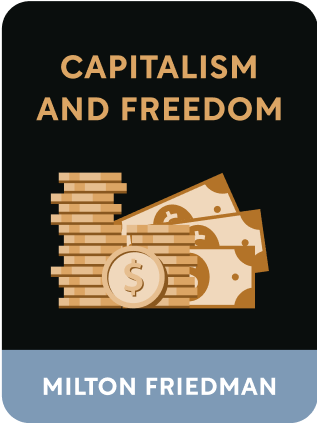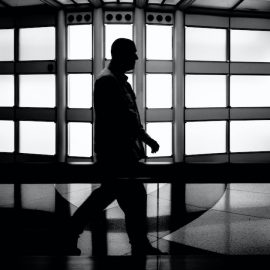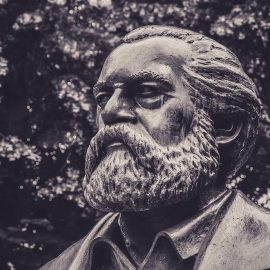

This article is an excerpt from the Shortform book guide to "Capitalism and Freedom" by Milton Friedman. Shortform has the world's best summaries and analyses of books you should be reading.
Like this article? Sign up for a free trial here .
What is the relation between economic and political freedom? How does Milton Friedman explain this connection in his book Capitalism and Freedom?
According to Milton Friedman, the relation between economic and political freedom is well established. In order for people to truly have freedom, they have to be able to live without restraints on their economic activities.
Read more about the relation between economic and political freedom below.
The Necessity of Economic Freedom
Economic freedom is an essential component of total freedom—the ability of an individual to pursue her own happiness and fulfillment without any external impediments, provided that she does not infringe on the freedom of others. In Capitalism and Freedom, Milton Friedman outlines the relation between economic and political freedom.
Any form of coercion is an assault on freedom. Thus, if you are forced to surrender part of your income to pay for old-age insurance (as with Social Security), you have been robbed of the ability to fully make decisions about what to do with the money you earn from your labor.
Similarly, if you are prohibited from entering a profession of your choice by licensing requirements, you are being prevented from exercising your freedom to apply your talent and initiative as you wish. In this chapter, we’ll explore:
- The link between economic freedom and political freedom; and
- Why the decentralizing tendencies of the free market serve as a powerful check on government power.
The Relation Between Economic and Political Freedom
Economic freedom is vital to political freedom. A society simply cannot have political freedom without the ability of individual buyers and sellers in a marketplace to engage in voluntary transactions that satisfy their needs. There has never been a successful example of a society that joined state control of the economy (in the form of socialism or communism) with political liberty.
Political power is dangerous, because it can be easily concentrated and centralized in the hands of the few. Economic power, however, works differently. In a well-functioning capitalist society, millions of individual buyers and sellers make decisions about which goods and services they require to satisfy their needs. As long as there are no monopolies, buyers are free to choose their sellers, sellers to choose their buyers, and workers to choose their employers.
Thus, a great deal of power over a crucial area of day-to-day life is taken away from the hands of the few, and placed into the hands of the many. Free markets are inherently decentralized in nature, thus maximizing individual freedom and choice. In a capitalist society, economic power acts as a check on the power of political authorities because it is not in the hands of the government.
The Threat of Unchecked Political Power
In a communist society, it would be impossible for someone to exercise their political freedom to, for example, champion capitalism. This is because engaging in any political cause costs money. But in a communist society, there is no voluntary exchange—the government controls all the jobs and restricts how money may be spent. Thus, the advocate of capitalism would be dependent on the goodwill of her communist paymasters in order to be able to spread her message. Given their control of her income, it would be unrealistic to assume that they would allow her to do this, showing the relation between economic and political freedom.
Even if she somehow gathered the money to do this, she would face further obstacles owing to control by the political authorities of all the economic means of production. She would have to print her pamphlets at a government-run print shop, host her website on government-run servers, and speak to audiences at government-run venues. Her lack of economic freedom would thus inhibit the exercise of her political freedom.
Contrast this with the experience of an advocate for communism in a capitalist society. In such a society, the means of production are in private, not government hands. Thus, a communist activist only needs to convince others of the worthiness of her cause and persuade them to contribute funds so she can promote her message.
These patrons, because they live in a capitalist society, are free to use their money as they please. Thus, the activist’s economic freedom facilitates the exercise of her political freedom.
The Hollywood Blacklist and Economic Freedom
The experience of blacklisted writers during the 1950s provides a neat real-world illustration of this dynamic. Hollywood screenwriters who were suspected of communist sympathies had been blacklisted by the studios, under pressure from hardline anticommunist politicians. This prevented these screenwriters from exercising their economic freedoms to use their literary talent to earn a livelihood. This event is an example of the relation between economic and political freedom.
But the free market provided the corrective for this gross infringement of economic liberty. Studios simply could not continue the practice of refusing to purchase high-quality scripts because of their writers’ political beliefs—as the studios argued, they had a financial responsibility to make as much money as possible for their shareholders, which, in turn, meant purchasing the best possible scripts to turn into high-quality, high-grossing films.
Thus, because they lived in a free-market society, even communists could enjoy the privilege of exercising their economic and political freedom.
Milton claims that the relation between economic and political freedom is clear, and they are important to one another.

———End of Preview———
Like what you just read? Read the rest of the world's best book summary and analysis of Milton Friedman's "Capitalism and Freedom" at Shortform .
Here's what you'll find in our full Capitalism and Freedom summary :
- The key principles from Milton Friedman's Nobel Prize-winning book
- Why capitalism functions best when it is freed from government restraints
- How forced redistribution schemes are morally unjust






